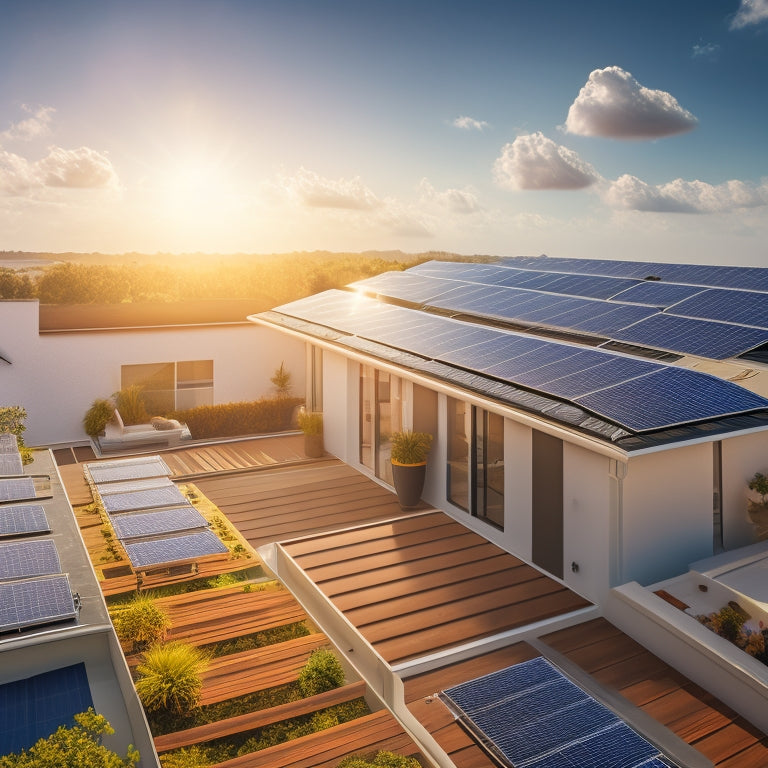
Top Online Solar Panel Kits for Homeowners
Share
You're looking for premium online solar panel kits that cater to your specific energy needs and budget constraints, ensuring a smooth shift to renewable energy for your home. Reputable brands like Renogy, Grape Solar, HQST, Eco-Worthy, and Goal Zero offer high-quality products with efficient energy production. Before making a purchase, consider factors like energy requirements, roof type, and local incentives to maximize your investment. Research and evaluate products carefully, checking specs, shipping options, and return policies. Explore the leading online solar panel kits to find the best fit for your home, and discover how to make the most of your renewable energy investment.
Key Takeaways
• Renogy 400W Solar Starter Kit is a popular online option, including panels, charge controller, and mounting brackets for a seamless setup.
• Grape Solar 400W Off-Grid Solar Panel Kit is ideal for off-grid applications, providing reliable power for homes and cabins.
• HQST 100W Monocrystalline Solar Panel Kit is a compact and efficient option for small-scale projects, perfect for beginners or small energy needs.
• Eco-Worthy 1200W Off-Grid Solar Panel Kit is suitable for larger energy needs, offering a reliable and affordable solution for homeowners.
• Goal Zero Yeti 1400 Lithium Portable Power Station is a versatile and portable power solution, ideal for camping, RVs, or home backup power.
Best Solar Panel Brands Online
What sets apart the best solar panel brands online, and how do they cater to your specific needs and budget as a homeowner?
In the competitive solar industry, brand loyalty is essential. You want a brand that offers high-quality products, reliable customer service, and a warranty that backs up their claims.
The best solar panel brands online prioritize your needs, providing personalized solutions that fit your budget and energy requirements. They understand that every homeowner is unique, with distinct energy needs and constraints.
Top brands like Panasonic, Tesla, and SunPower offer a range of products that cater to different needs, from residential to commercial applications. They invest in research and development, ensuring their products are efficient, durable, and environmentally friendly.
By choosing a reputable brand, you can rest assured that your solar panel system will provide clean energy for years to come. With brand loyalty, you'll enjoy priority customer support, extended warranties, and access to exclusive promotions.
In the solar industry, brand loyalty is key to a successful and sustainable energy solution.
Top-Rated Residential Solar Kits
When shopping for a residential solar kit, you'll find top-rated options that cater to your specific energy needs and budget, with popular brands like Renogy and HQST offering all-inclusive systems that include high-efficiency panels, durable mounting hardware, and reliable inverters. These top-rated kits are designed to provide you with Energy Security, ensuring a reliable source of power for your home.
Here are three key benefits to take into account when choosing a top-rated residential solar kit:
-
Increased Energy Independence: With a residential solar kit, you can reduce your reliance on the grid and enjoy Energy Security.
-
Solar Incentives: Many top-rated kits qualify for federal and state tax credits, rebates, and other Solar Incentives that can help offset the upfront cost.
-
High-Efficiency Performance: Look for kits with high-efficiency panels that maximize energy production, ensuring you get the most out of your investment.
DIY Solar Panel Installation
By opting for a DIY solar panel installation, you're taking control of the installation process, reducing labor costs, and guaranteeing a customized fit for your residential solar kit. This approach requires careful planning, attention to detail, and adherence to safety protocols. You'll need to make sure you have the necessary tools, including a drill, wire strippers, and a multimeter, to name a few.
Familiarize yourself with local building codes and electrical regulations to avoid any potential setbacks. It's essential to follow proper safety protocols to prevent electrical shock, falls, and other hazards. Always wear protective gear, including gloves, safety glasses, and a hard hat, when working at heights or with electrical components. Ensure a stable and secure rooftop environment by securing loose objects and covering skylights.
Additionally, turn off the main electrical power supply before starting the installation to avoid electrical shock. With careful planning, attention to detail, and adherence to safety protocols, you'll be well on your way to a successful DIY solar panel installation.
Most Affordable Solar Panel Systems
When looking for the most budget-friendly solar panel systems, you'll need to evaluate factors such as the type and quality of equipment, installation costs, and local incentives, as well as assess your energy needs and budget. With budget constraints in mind, prioritizing system durability is crucial to guarantee your investment lasts for years to come.
Here are three key considerations to keep in mind when searching for an affordable solar panel system:
-
Efficiency vs. Cost:
While high-efficiency panels may be more expensive, they can provide more power per hour of sunlight. Weigh the benefits of higher efficiency against the added cost. -
Installation Costs:
Consider the cost of installation, including labor and materials. Look for systems with easy installation processes to reduce labor costs. -
Local Incentives:
Research local and national incentives, such as tax credits or rebates, that can help offset the upfront cost of your solar panel system.
High-Efficiency Solar Panel Options
If you need to maximize energy production from a limited roof space or have specific energy requirements, you should explore high-efficiency solar panel options. These premium panels are designed to deliver more power per hour of sunlight, making them ideal for homeowners with limited roof space or high energy demands.
Look for solar panels with high-efficiency ratings, typically above 20%. These panels often come with advanced features like bifacial cells, which can harness energy from both sides of the panel, increasing energy output. Be sure to check for reputable Solar Certifications, such as UL (Underwriters Laboratories) or IEC (International Electrotechnical Commission), which validate that the panels meet rigorous standards for performance and safety.
When evaluating high-efficiency solar panels, consider the energy output per unit area, measured in watts per square meter (W/m²). A higher energy output means more power generated from the same roof space. By choosing high-efficiency solar panels, you can optimize your energy production and meet your specific energy requirements.
Solar Panel Kit Comparison Guide
When shopping for an online solar panel kit, you'll want to thoroughly assess the features and specs of each kit to make sure it meets your energy needs.
You'll also need to take into account the pricing and value of each kit, weighing the costs against the benefits and long-term savings.
Kit Features and Specs
What specific features and specifications should you look for in a solar panel kit to make certain it meets your energy needs and integrates seamlessly with your home's electrical system?
As you explore different options, keep an eye out for the following key features:
-
Solar Compatibility: Guarantee the kit is compatible with your roof type, size, and orientation. This will maximize energy production and reduce installation complexities.
-
Energy Monitoring: Look for kits with built-in monitoring systems that provide real-time energy production data, allowing you to track your energy savings and identify potential issues.
-
Inverter Efficiency: Opt for kits with high-efficiency inverters (>95%) to minimize energy losses and maximize your solar power output.
When evaluating solar panel kits, consider these critical features to make sure you're getting a system that meets your energy needs and integrates seamlessly with your home's electrical system.
Kit Pricing and Value
You've carefully evaluated the features and specs of various solar panel kits, now it's time to crunch the numbers and assess the overall value proposition of each option. As you weigh the costs and benefits, consider your budget constraints and prioritize the kits that offer the best cost savings.
When evaluating kit pricing, consider the upfront cost of the system, as well as the long-term savings on your energy bills. A higher upfront cost doesn't always translate to better value; instead, calculate the cost per watt to get a more accurate picture.
Look for kits that offer a balance of quality and affordability. Be wary of extremely low prices, as they may indicate lower-quality components or incomplete systems. On the other hand, don't assume that the most expensive kit is automatically the best.
Benefits of Buying Solar Online
Buying solar panels online can save homeowners an average of 10% to 20% compared to purchasing from a traditional retailer, thanks to reduced marketing and distribution costs. This is because online retailers don't have to worry about maintaining a physical storefront, which translates to lower prices for you. Plus, you can shop from the comfort of your own home, 24/7, and get your solar panel kit delivered right to your doorstep.
Here are just a few benefits of buying solar online:
-
Convenience factor: Shopping online allows you to compare prices, read reviews, and research different products at your own pace, without any sales pressure.
-
Online discounts: Many online retailers offer exclusive discounts and promotions that you won't find in physical stores.
-
Wider selection: Online retailers often have a wider range of products and brands to choose from, giving you more options to find the perfect solar panel kit for your needs.
Online Solar Panel Shopping Tips
When shopping for solar panels online, you'll want to carefully research and evaluate different products to make sure you're getting the right kit for your energy needs. With so many options available, it's important to take into account several factors before making a purchase.
First, check the product specifications to confirm the kit can meet your energy requirements. Look for the wattage, voltage, and ampere ratings to make sure they align with your needs.
Next, review the shipping options and estimated delivery times. You'll want to choose a retailer that offers reliable and efficient shipping to minimize delays. Additionally, be sure to review the return policies in case you need to exchange or return the product. A reputable retailer should have a clear and customer-friendly return policy.
Frequently Asked Questions
Can I Install Solar Panels on a Metal Roof?
"Are you ready to harness the sun's power on your metal roof? You can, but first, consider the roof material: metal roofing with a standing seam or corrugated design is ideal for solar panel installation, ensuring a secure and efficient energy harvest."
Do Solar Panels Work During a Power Outage?
During a power outage, you'll need a battery backup system to keep your solar panels generating electricity, ensuring grid independence and providing backup power when you need it most.
Are Solar Panels Resistant to Hail Damage?
You might be surprised to know that 99% of solar panels survive hail storms unscathed! To guarantee this, manufacturers subject panels to rigorous hail storm tests, simulating 25mm hailstones at 23m/s. This weather durability is assured through rigorous testing and certification.
How Long Do Solar Panel Warranties Usually Last?
You'll typically find manufacturer guarantees lasting 25 years or more, providing performance assurance that your solar panels will maintain at least 80% of their original power output over that period, ensuring reliable energy production.
Can I Sell Excess Energy Back to the Grid?
"When you're cooking with gas, generating excess energy, you can sell it back to the grid through Net Metering, earning Renewable Credits, and offsetting your utility bills, giving you a sweet return on investment."
Related Posts
-

Why Eco-Friendly Rides Are the Future of Commuting
As you seek alternatives to traditional vehicles, you'll find eco-friendly rides are not only convenient and cost-eff...
-

Why Regular Vehicle Panel Maintenance Matters Locally
You know that regular vehicle panel maintenance is essential to optimize your vehicle's performance, energy efficienc...
-

Why Recharge Your Car Battery With DIY Power?
By switching to DIY solar power, you can drastically reduce your reliance on expensive battery services, lower your c...


